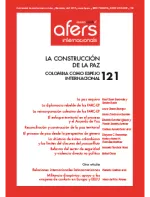Peacebuilding in Colombia: security sector reform and non-political direct violence

This paper focuses on the opportunity, in the short and medium term, for a Colombia that is an OECD member and NATO partner to face the challenges of the public security transition, despite no explicit mention of it appearing in the Peace Agreement (or Final Agreement). To do this, an anomaly will have to be overcome: the so-called “Lleras Camargo duality”, which has facilitated excessive decisional autonomy of the security forces, scant parliamentary control and insufficient political leadership of defence. The paper is divided into contextual and a priori sections, with another analytical section focussing on conceptual clarifications and practical lessons of a comparative nature. The final part is dedicated to Colombia’s particularities and the presentation of a proposal for addressing eight major challenges: three general, two focused on external security, and three on internal security.
Key words: Colombia, peace process, transition, security, security forces, non-political direct violence
DOI: doi.org/10.24241/rcai.2019.121.1.157
>> The full text articles of this issue are available only in Spanish language
How to cite this article: Grasa, Rafael. «Construir paz en Colombia: reforma del sector de seguridad y violencia directa no política». Revista CIDOB d’Afers Internacionals, n.º 121 (abril de 2019). doi.org/10.24241/rcai.2019.121.1.157